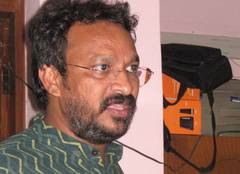The violence of manual scavenging in India

Bezwada Wilson leads a campaign that he hopes will result in the liberation of 1.3 million Indians by 31 December 2010, and it is his spirit that helps mobilize the victims of the caste system.
by Karen Burke (*)
On a dimly lit balcony in Delhi, the mosquitoes begin to close in.
I am talking to the man who Outlook magazine – one of the top-selling English news magazines in India – named among the 25 most influential Indians without wealth or official power last year, and so it is perhaps unsurprising that he is not distracted by a few mosquitoes.
As the national convenor of Safai Karmachari Andolan – a movement for the elimination of manual scavenging – Bezwada Wilson is leading a campaign that he hopes will result in the liberation of 1.3 million Indians by 31 December 2010, and it is his spirit that is helping to mobilize the victims of the caste system.
“Manual scavenging was prohibited in 1993,” Wilson explains to me on the balcony of the home of Paul Divakar, General Secretary of the National Campaign on Dalit Human Rights (NCDHR), who is hosting a fellowship dinner for a “Living Letters” team of ecumenical representatives from the World Council of Churches (WCC).
“But there were no prosecutions against people exploiting manual scavengers until this year. Twenty one prosecutions were commenced, but they all got bail the next day,” Wilson informs me.
Safai Karmachari Andolan has waited long enough for the authorities. If the law is not being implemented to free people from the inhumanity of manual scavenging in all of India’s districts, then Safai Karmachari Andolan feels there is no other option but to encourage people to free themselves.
“We have a plan to eradicate manual scavenging in India within 36 months starting from 1 January 2008 to 31 December 2010,” Wilson says.
“The community should just stop work. No human being should have to clean other people’s excrement."
Despite the fact that the caste system was abolished under India’s constitution in 1950, “untouchability” is still practised, particularly in rural areas. Communities allocate work they consider the most menial to outcast Dalits. In some rural schools, Dalit children are made to clean the school toilets and sit at the back of the class in case they “pollute” children from higher castes. About 80 percent of manual scavengers are women.
In September, the Central Committee of the WCC released a strong statement on caste-based discrimination, declaring that it contradicts the Christian teaching that all are created equal in the image of God, and calling on member churches to "recognize that the continued discrimination and exclusion of millions of people on the basis of caste" is a "serious challenge to the credibility of their witness to their faith in God".
The psychological battle and international visibility
"Living Letters" are small international ecumenical teams travelling to locations around the world where Christians strive to overcome violence. Their goal is to express the solidarity of the ecumenical family and learn how people are dealing with the challenges that face them.
As part of the visit to India, the Living Letters team met with activists from the Dalit liberation movement and from Safai Karmachari Andolan.
Divakar and Wilson met the eight team members at the NCDHR Centre for Inclusion and Equity in Delhi.
“It is difficult for the country of Gandhi, the country of peace, to say that it has this problem with Dalits, so internationalizing the issue has really helped,” said Divakar.
Much of the struggle involves liberating Dalits from the psychological burden of the caste system that places Hindu Brahmins at the top of the social hierarchy.
Divakar explained: “A Dalit needs to realize, ‘There is no Brahmin on my head. I have the Brahmin in my mind and I have internalized that.’”
When Wilson saw how deeply the caste system had beaten its way inside his brother’s mind, he resolved to dedicate his energies to fighting it.
“I remember going into the Employment Exchange to register for employment after I had finished my education,” Wilson recalled. “I was given a card with a code on it and this code identified my occupation. Despite my qualifications, I had been allocated the job of manual scavenging because that is what my parents had done.
“My brother gave up everything so that I could get an education and I was so surprised when I showed him the card and he said, ‘OK, no problem. This is the way it works in this country.’ The Brahmin was in the mind of my brother.”
Since then, Wilson has been lobbying local authorities and courts as well as raising consciousness among manual scavengers that cleaning human excrement with their bare hands is an inhumane occupation.
“My Christian faith has taught me from childhood that we are all equal. That is the one thing that showed me that manual scavenging can’t be accepted.”
(*) Karen Burke is a journalist and the media officer for the Methodist Church in Britain.
"Despite women-friendly laws, discrimination and violence remain, Indian activists say"
"Indian Christian leaders call for an end to caste-based discrimination, also within churches"
WCC programme on solidarity with Dalits for justice and dignity



